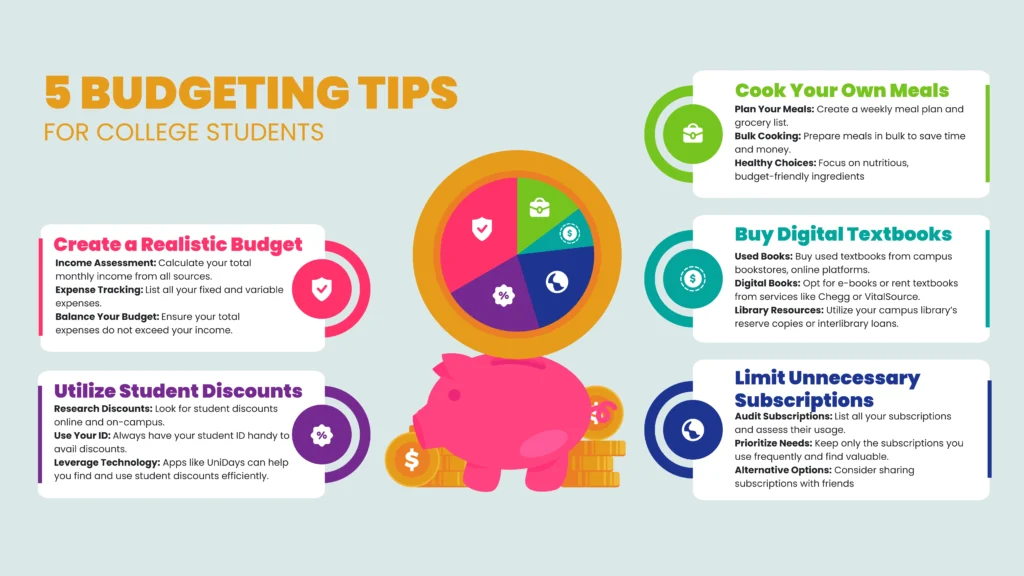5 Budgeting Tips for College Students: How to Save Money
College life is a thrilling journey filled with new experiences, challenges, and the thrill of newfound independence. However, it can also come with financial stress. Between tuition, textbooks, rent, and daily expenses, managing money can seem overwhelming. As someone who’s been there, I understand the struggle. That’s why I’m here to share practical budgeting tips that will help you save money as a student, allowing you to focus more on your studies and less on financial worries. Let’s dive into these five essential tips designed to help you manage your money better and make your college years financially stable.

1. Create a Realistic Budget
The cornerstone of any good financial plan is a well-thought-out budget. Creating a realistic budget is the first step toward taking control of your finances. Start by listing all your sources of income, including student loans, scholarships, part-time job earnings, and any financial support from family. Next, outline your monthly expenses such as rent, utilities, groceries, transportation, and entertainment.
How It Works:
– Income Assessment: Calculate your total monthly income from all sources.
– Expense Tracking: List all your fixed and variable expenses.
– Balance Your Budget: Ensure your total expenses do not exceed your income.
Benefits:
– Avoid Overspending: A clear budget helps you live within your means, preventing unnecessary debt.
– Financial Awareness: You’ll be more aware of where your money is going, making it easier to spot areas to cut costs.
– Stress Reduction: Knowing you have a plan can significantly reduce financial anxiety.
Using budgeting apps like Mint or YNAB (You Need A Budget) can simplify this process, providing visual insights into your spending habits.
– Related Topic: 50/30/20 Rule-The Best Budget Rule for Beginner
2. Utilize Student Discounts
As a student, you have access to a plethora of discounts and special offers. These discounts can be found in many areas, including transportation, software, clothing, and food. Always carry your student ID and don’t hesitate to ask if a student discount is available wherever you shop.
How It Works:
– Research Discounts: Look for student discounts online and on-campus.
– Use Your ID: Always have your student ID handy to avail discounts.
– Leverage Technology: Apps like UniDays and Student Beans can help you find and use student discounts efficiently.
Benefits:
– Cost Savings: Significant discounts can help you save a substantial amount of money over time.
– Access to Premium Services: Enjoy services and products at a reduced rate that you might not afford otherwise.
– Budgeting Ease: Lower costs make it easier to stick to your budget without sacrificing your needs and wants.
Don’t underestimate the power of student discounts—they can make a big difference in your overall spending.
3. Cook Your Own Meals
Eating out frequently can quickly drain your finances. While it’s tempting to grab a quick bite between classes or order delivery, these costs add up. Instead, cooking your meals can save you a significant amount of money and is often healthier.
How It Works:
– Plan Your Meals: Create a weekly meal plan and grocery list.
– Bulk Cooking: Prepare meals in bulk to save time and money.
– Healthy Choices: Focus on nutritious, budget-friendly ingredients like grains, vegetables, and proteins.
Benefits:
– Financial Savings: Cooking at home is significantly cheaper than dining out.
– Healthier Lifestyle: Home-cooked meals are generally healthier and more balanced.
– Skill Development: Cooking is a valuable life skill that can serve you well beyond college.
Investing in basic kitchen equipment and learning simple recipes can make a huge difference in your budget.
4. Buy Used or Digital Textbooks
Textbooks are one of the biggest expenses for college students. However, there are ways to save significantly on these costs by purchasing used textbooks or opting for digital versions.
How It Works:
– Used Books: Buy used textbooks from campus bookstores, online platforms like Amazon, or other students.
– Digital Books: Opt for e-books or rent textbooks from services like Chegg or VitalSource.
– Library Resources: Utilize your campus library’s reserve copies or interlibrary loans.
Benefits:
– Cost Efficiency: Used or digital textbooks are often much cheaper than new ones.
– Convenience: Digital textbooks are portable and can be accessed from multiple devices.
– Sustainability: Buying used books is environmentally friendly.
By being savvy with your textbook purchases, you can free up funds for other necessary expenses.
5. Limit Unnecessary Subscriptions
It’s easy to sign up for multiple subscription services, from streaming platforms to monthly boxes. While these services are convenient, they can quickly add up. Evaluate your subscriptions and cancel those you don’t use regularly.
How It Works:
– Audit Subscriptions: List all your subscriptions and assess their usage.
– Prioritize Needs: Keep only the subscriptions you use frequently and find valuable.
– Alternative Options: Consider sharing subscriptions with friends or using free alternatives.
Benefits:
– Monthly Savings: Reducing unnecessary subscriptions can save you a substantial amount each month.
– Increased Awareness: Regularly reviewing your subscriptions keeps you mindful of your spending habits.
– Financial Flexibility: Freeing up money from subscriptions allows you to allocate it to more critical expenses.
Taking a closer look at recurring expenses can help you maintain a healthier budget.
Conclusion
Budgeting in college might seem challenging, but it’s a crucial skill that will serve you well throughout your life. By creating a realistic budget, utilizing student discounts, cooking your meals, buying used or digital textbooks, and limiting unnecessary subscriptions, you can significantly ease financial stress and save money.
Secret Tip: Take Advantage of Campus Resources
Your college campus is filled with resources designed to help students save money. From free events and workshops to discounted transportation passes, make sure to take full advantage of what’s available.
By implementing these budgeting tips, you’ll be on your way to financial stability and success. Remember, every small saving adds up over time, making a big difference in your financial health.
If you found these tips helpful, be sure to check out our other blog posts for more advice on managing your finances, acing your studies, and making the most of your college experience. Stay tuned and keep saving!






